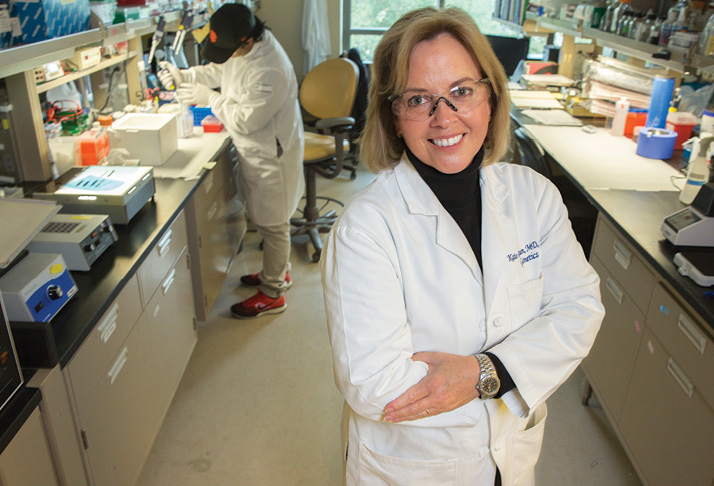
Chatting with Katherine Rauen
Chief of the Division of Genomic Medicine in the UC Davis Department of Pediatrics
Q: Your research has focused on a set of fairly common medical genetic syndromes. What are they?
A: My work revolves around a group of genetic syndromes called RASopathies, a term I coined and is now used worldwide. These syndromes are caused by mutations in a very important signaling pathway called the Ras/MAPK pathway. It regulates cell growth, which is critical for normal fetal development and, when dysregulated, can cause cancer.
Q: What are the clinical implications for patients who have these Syndromes?
A: When you are born with a RASopathy, it’s not uncommon to have problems with your heart. Also common are problems in brain function and with your skin, and you are more susceptible to cancer. The first RASopathy identified was neurofibromatosis type 1. More recently, several |cousin syndromes have been identified, such as Noonan, Costello and CFC syndromes, to name a few. Individually, they are still considered rare, but when you look at these syndromes as a group, you see that more than one in 1,000 people worldwide are born with a RASopathy.
Q: Can you explain the relationship between RASopathies and cancer research?
A: The Ras pathway has been a focus in cancer research for decades, because Ras mutations are found in about 30 percent of cancers, including colon, lung and brain cancers. Most cancer clinicians and researchers are focused, as they should be, on cancers that may develop later in life. What makes RASopathies so important in relation to cancer is that they give us a rare opportunity to look at a signal pathway in development, because people are born with the genetic mutation in every single cell of the body. So they really allow us to broaden our horizons, learn about the biologic function of the Ras pathway and more about these genes, and ultimately develop better therapies. It’s sort of like looking at treatments for cancer by coming in through the back door.
Q: What’s your role with the UC Davis Comprehensive Cancer Center?
A: My area of study is Ras biology in development, so it’s a natural fit with the cancer center. I’m really glad I’ve been accepted as a member and that everyone here has embraced the RASopathies. Although the RASopathies involve dysregulated Ras and/or its pathway components, I am interested in how dysregulated Ras affects development early on, and how this can lead to cancer in the future. The fact that Dr. de Vere White (director of the UC Davis Comprehensive Cancer Center) and his team embraced the RASopathies was exciting. They understood the importance of studying Ras, not only from the standpoint of cancers that develop later in life but also from the standpoint of cells with genetic material that can be passed on.
Q: You came from a medical powerhouse, UC San Francisco, and you’ve been at UC Davis for a little over a year. What’s your take on the health system and its potential?
A: I am a product of the UC system, and all UCs have their particular strengths and are powerhouses in their own way. UC Davis is a younger medical center campus, and has many strengths. It’s a gem, really, and I think it’s beginning to harness its strengths, develop critical mass and build momentum. Two examples: no other UC can do telemedicine like Davis, and it’s very strong in EHR (electronic health records). Those strengths are going to be critical to the future of genomic medicine.
Q: It’s a new year. What’s your vision for 2015?
A: It took me awhile to get the lay of the land, but now I’m eager to move genomic medicine forward — not just in pediatrics, but in every aspect of medicine. Genomic medicine is here to stay, and it’s barreling down on us like a freight train. So we not only need to engage future physicians and healthcare providers, but our current providers.
So 2015 for me is really about moving forward at light speed to spread genomic medicine throughout the health system, and provide the best and most innovative care possible to our patients.
